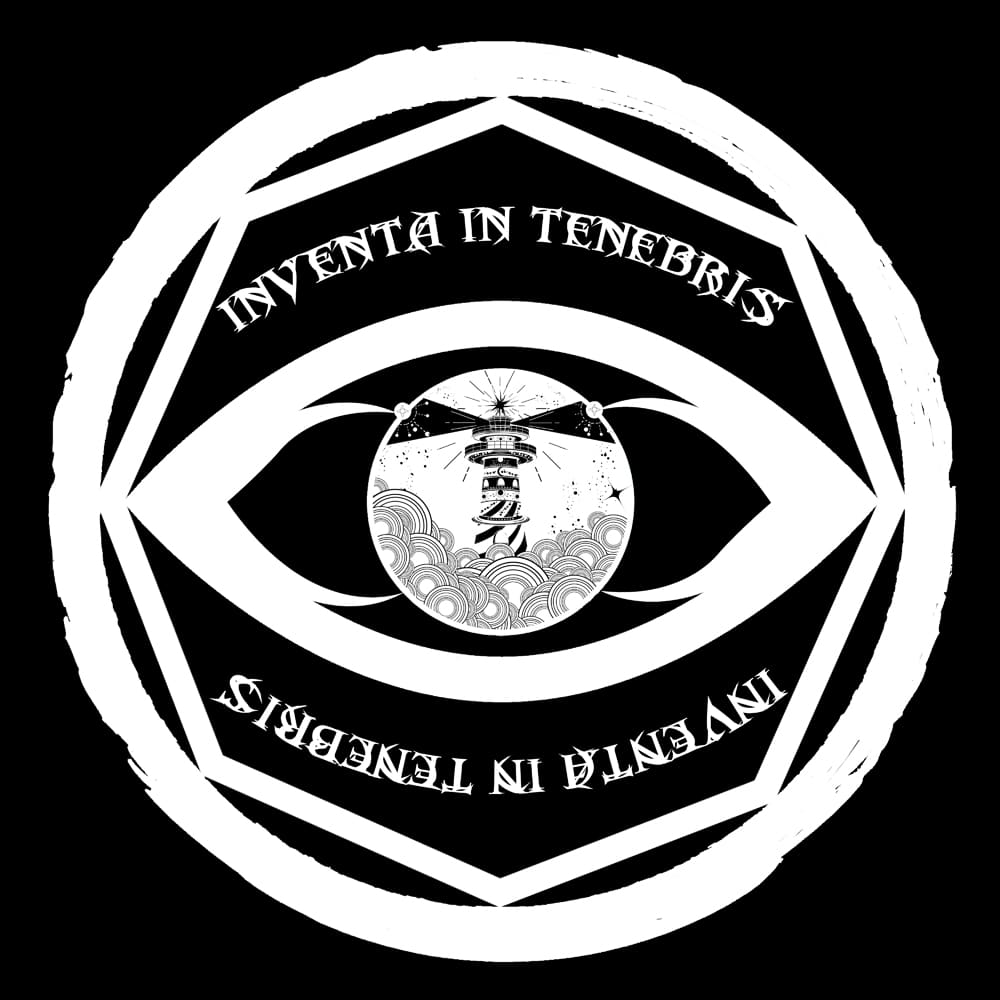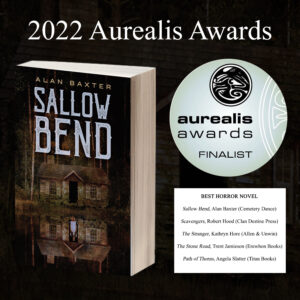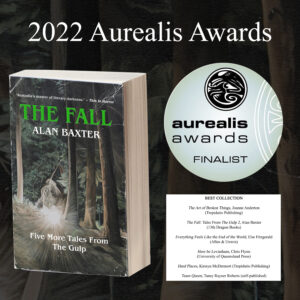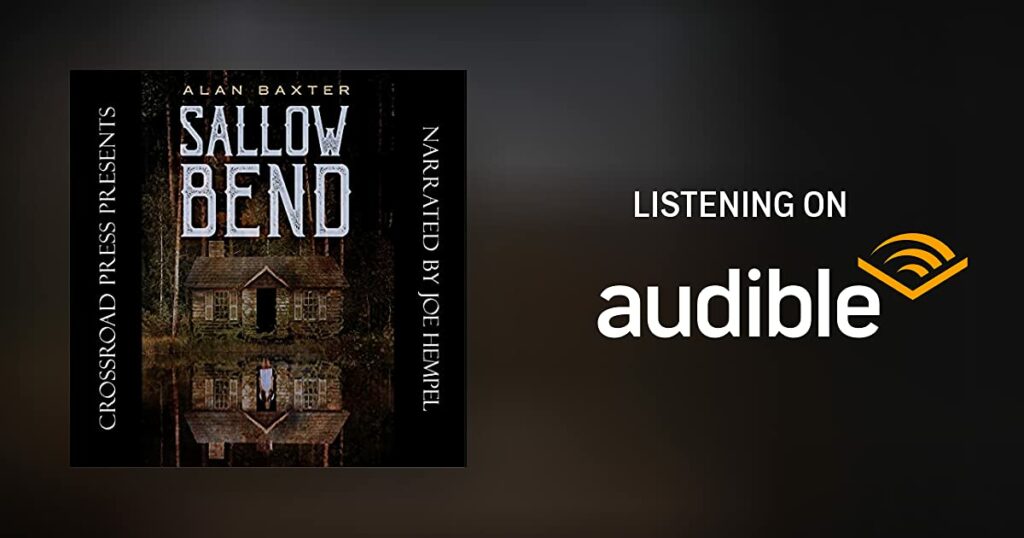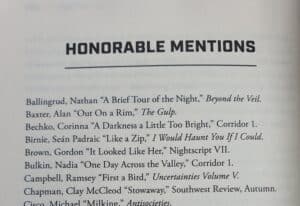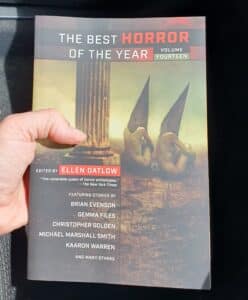Sallow Bend and The Fall are Aurealis Awards FInalists
What an absolute blast to discover myself twice on the recently released 2022 Aurealis Awards shortlists! The Aurealis is the premier genre ficiton award in Australia and I’ve been after one my entire career. Last year, I finally won my first, for The Gulp in Best Collection. That was my 11th nomination! So imagine my joy yesterday when the 2022 shortlists were announced and I saw The Fall, the follow-up to The Gulp, listed in Best Collection and Sallow Bend listed in Best Horror Novel. Amazing! The talent on those two shortlists alone, let alone the rest of the categories, is amazing. Huge congratulations to all the nominees. I’m ecstatic! Full shortlists are here.
SALLOW BEND now in audio
It can be tough to get audiobooks of new work when you don’t have a huge marketing machine behind you, as good narration isn’t cheap and cheap narration isn’t good. So I was very happy when Crossroad Press offered to organise an audiobook of Sallow Bend. Published in print and ebook by Cemetery Dance, the book has been really well-received, so to pick up an audio deal was great news. They asked who I might like to narrate it. One of my favourite readers lately is Joe Hempel and, not expecting him to agree, I put Joe’s name forward. I was super-excited when he said yes.
I’ve just finished listening to his narration of the book and it’s so good. I couldn’t be happier with it. It’s available now via Audible if that’s your thing, and I’d love it if you gave it a listen.
An open letter to the HWA regarding Thomas F. Monteleone
To the HWA President, Vice President, Trustees, et al
As an Active Member of the HWA, I’m writing to add my voice to all the other members demanding Tom Monteleone be expelled from the organization and barred from attending future HWA events. His recent words and actions on social media, and the podcast which I won’t share as I’m sure you’re already aware of it, have revealed his true character in no uncertain terms.
It is particularly saddening to see someone who was considered a legend in the field reveal themselves to be as racist, transphobic, and bigoted as Monteleone has. But more important than lamenting the self-immolation of one person is the direct harm those comments and actions cause to so many others.
Allowing Monteleone to remain in the organisation and to attend HWA events will be putting a large number of people directly in harm’s way. It will also show the HWA is complicit rather than active in the face of hate speech.
The organisation’s by-laws allow for action to be taken, and I suggest action needs to be taken swiftly and decisively to protect the integrity of the organisation and, more importantly, the safety and well-being of its members. I know stuff like this isn’t easy, but the standard you ignore is the standard you accept and I cannot accept this. So I stand up to be counted.
Sincerely
Alan Baxter
Sallow Bend hits the Bram Stoker Awards® preliminary ballot
I was absolutely floored this morning to see my latest novel, Sallow Bend, on the preliminary ballot for the Bram Stoker Awards®. This is the longlist, so it’s not a finalist yet, but it’s a huge step all the same. I’ve got all my fingers crossed that it makes it through to the next round, when it will officially become a finalist. This will be my third shot at such a prestigious achievement. Previously, Crow Shine and The Gulp both made the preliminary ballot for Superior Achievement in a Fiction Collection, but neither made it through to the shortlist. Third time lucky? Here’s hoping. Then again, look at the rarified company this book is currently keeping (including Stephen King, holy shit…). If any HWA voting members haven’t read Sallow Bend yet and would like a copy, please hit me up and I’ll get one to you right away. Here’s the full preliminary ballot for Novel:
The 2022 Bram Stoker Awards® Preliminary Ballot
Superior Achievement in a Novel
Baxter, Alan – Sallow Bend (Cemetery Dance Publications)
Iglesias, Gabino – The Devil Takes You Home (Mullholland Press)
Ihli, Noelle W. – Ask for Andrea (Dynamite Books)
Katsu, Alma – The Fervor (G.P. Putnam’s Sons)
King, Stephen – Fairy Tale (Scribner)
Kiste, Gwendolyn – Reluctant Immortals (Saga Press)
Kraus, Daniel – The Ghost That Ate Us: The Tragic True Story of the Burger City Poltergeist (Raw Dog Screaming Press)
Malerman, Josh – Daphne (Del Rey)
Nix, Gwendolyn – I Have Asked to Be Where No Storms Came (Crystal Lake Publishing)
Roberts, Nick – The Exorcist’s House(Crystal Lake Publishing)
Ward, Catriona – Sundial (Tor Nightfire)
And here’s the full ballot with all categories.
Huge congratulations to everyone across the board – what an amazing display of dark fiction talent. I’m honoured to be a one small part of it.
Content warnings are not weakness
I posted a version of this back in 2021, but rather than edit that I’m reposting, as the link to the previous one is in several places online. This is an updated version to address a couple of points that always come up in relation to this subject.
There are frequently posts on social media where a certain subset of people end up ranting about including content warnings in horror books. Content warnings are sometimes called trigger warnings, but given the way edgelords all over have co-opted the term “trigger” as some kind of insult, it’s actually easier and more accurate to refer to what they actually are – warnings about the contents of any given book (or movie, etc.). From here on, I’m going to refer to them simply as CW.
There was a day when I was against the idea of CW, then I learned more. Now I’m not. Horror, or any other fiction for that matter, has no rules. Story is how we mirror and interrogate our world. Write your soul, your pain, your truth. Anyone who tries to tell you what you can write can go suck it. Equally, if you write something deeply offensive or harmful to others, be ready for consequences. Don’t be a dick is always the benchmark, for fiction of any kind or life in general. But write what you want. You should always consider whether a story is yours to tell, but we want diversity in our fiction. We want to see our world reflected. Doing that without harm is the trick.
Horror, of course, is meant to be confronting. But that doesn’t mean it should be traumatic, or that people avoiding trauma are somehow wrong, weak, or censors. If a reader asks for CW, that’s okay. People carry all kinds of trauma they don’t want reinforced. CW are not censorship. You don’t have to include them, of course, but don’t deny or complain about others discussing them. That’s a dick move. A lot of people don’t want CW, they want no spoilers. Fair enough, I’m like that too. CW should definitely be somewhere out of sight. A good idea is the back of the book maybe, where people who want them can look. Another option is to have them available via the publisher or author website. That’s an inclusive move. I’ve added a page to my site here that people can check or be directed to, then anyone who might need a warning about the content of any of my books can find what they need. It’s not exhaustive, but it’s something. I definitely deal with some seriously fucked up shit in my stories. Horror is the genre of honesty, after all, and honestly, the world can be pretty fucked up.
But the idea that people asking for CW are somehow “snowflakes” is bloody toxic. If I love cake but I’m allergic to peanuts, it’s not censorship of the cake’s integrity or commentary on the cake’s validity to include a list of ingredients. It’s not weak of someone with a peanut allergy to want to avoid a cake that can harm them. People without allergies can ignore the ingredient list. People with peanut allergies can stay safe. It’s really that simple. If you don’t include a list of ingredients and someone has a peanut allergy, they’ll avoid all your cakes entirely just in case. But if they have one allergy and your ingredients point out their problem isn’t in the cake, you might even gain a new reader. Do people read cakes? This analogy has taken me down a dark alley and mugged me. Let’s move on.
I don’t think books should have CW included. If you want to put them in the back, or somewhere people can easily ignore them or find them, that’s great. But they shouldn’t be required by any means. There are inherent issues that arise from that kind of prescriptivism. As is often the case, the best way lies somewhere along the middle path. Supplying a resource like I’ve done on my site here is easy and it’s kind. The vast majority of people don’t need CW, don’t care about them, and probably won’t ever even know about that particular page on my site. For the people who do need it though, there it is. Supplying that kind of information is such a simple kindness, and it’s a real indication of privilege and downright dickishness to say something like, “Ugh, the fact it’s horror should be trigger warning enough!” No, that’s not true. There are people out there who love horror but have PTSD from e.g. childhood abuse – they shouldn’t have that trauma reinforced while trying to enjoy books about ghosts or monsters or any other kind of horror.
And here’s where some edgelord (it’s always the edgelords and edgeladies) comes along and starts posting articles talking about how studies have shown that using trigger warnings in university courses can actually be counterproductive and so on. Like that’s some kind of gotcha. Guess what, fuckknuckle, we’re not talking about the real and challenging process of educating yourself at university. We’re talking about the kind of stuff that people choose to entertain themselves with. They shouldn’t be forced to confront damaging issues while they’re trying to relax and enjoy downtime.
And those same edgefolk always come along with something like, “These snowflakes need to take responsibility for themselves and their issues!” Guess what, fuckmuppet? That’s exactly what they’re doing. By asking for content warnings, they can judge for themselves and take personal responsibility for anything they consume. If it’s not something that is an issue for you, well done! You can literally just ignore it. It takes more energy for you to rant, incorrectly, about their “weakness” than it does for you to simply fuck on by. No one is changing your experience, and who the fuck are you to gatekeep a genre for others?
Just to reiterate:
Horror is meant to be confronting.
That doesn’t mean it should be traumatic, or that people avoiding trauma are somehow wrong, weak, or censors.
People with trauma can and do love horror.
If we can create whatever we want and protect people with trauma as well, why the fuck wouldn’t we?
The importance of your own place on the web
Ryan Cahill recently tweeted: “Processing some updates on my website and I stumbled across the stats differences from 2021 to 2022. 2021 had ~17k hits on my author website, ~5k visitors. 2022 the hits increased by 2.5 to ~43k, while the visitors tripled to ~15k. Websites are important.”
It is a really important point, especially with social media in the turmoil it is. Authors (or any other creative for that matter), your own central home on the internet is absolutely essential. As we’ve seen with the horrific Muskening of Twitter, it’s easy for a third party app to be absolutely fucked in pretty short order. Even if Twitter survives, engagement has dropped off a cliff and I don’t know if that will recover. I’ve talked to other authors who are worried as they’ve seen a significant drop in sales because they can’t talk directly to potential readers like they used to. There’s not a lot we can do about the loss of those promotional channels other than keep signing up for alternate social media sites and hopefully be around the next one as it grows into a main character in the social media landscape. We’re also almost certainly going to have to diversify and know that one site will no longer rule them all. But beyond all that, you need a website.
Twitter has for a long time been the main hangout for authors and readers. Being a primarily text-based interface, that makes sense. There are lots of alternatives out there, which I’ll get to later, but currently nothing compares to Twitter. And the imminent collapse of that site is what’s prompted this post. Any site can fail at any time, so if you rely only on social media for your online presence, you’re constantly playing digital Russian Roulette.
Get a website. Make it happen. Even a free one-page site with contact details is better than nothing. You can sign up today at WordPress or Wix or any of a bunch of other places and get a free site. Yes, there’s a chance that company could go under too, but those places don’t have the tenuous nature of social media and are unlikely to be bought and fucked by an alt-right manchild.
Ideally, you’ll have your own domain name (which isn’t too expensive) and paid hosting (which also doesn’t cost much for a simple few pages). It’s an important investment if you can afford it. That way you have control of your presence on the web. Whatever else happens, you always have a web address to direct people to. You always have something for people to find if they search for your name. Like this website right here. Mine is pretty big and complicated, but it’s been a work in progress for well over a decade. However, there are only two things you absolutely must have on your website:
ABOUT: This is just a longer version of any Twitter or Instagram or whatever bio. A decent chunk of information all about you and your work. You don’t need heaps of detail, but enough that anyone searching for you gets a good idea of who you are and what you do. This is my About page.
CONTACT: Here’s where you list at the very least your email address (or use a contact form widget that’s linked to your email address). People need to reach you. Sure, a lot of contact might be weirdoes or spam or whatever, but often it’ll be genuine fans, and that kind of mail is always awesome. And what if an editor wants to invite you to a project or reprint something of yours, etc. and they can’t reach you? They’ll go somewhere else. I’ve spoken to editors who have complained about exactly this – they wanted to work with someone, but had no way to get in touch. Here’s my Contact page. It lists loads of other stuff like my newsletter and Patreon and all my social media and stuff, but most importantly, right there front and centre at the top, is my email address for direct contact. (I have a separate email for “public” places like this and my more personal stuff, so that’s something to consider.)
After that, pages for your books, bibliography, etc. are all great, but About and Contact are essential. If you look around my site you’ll see there’s a page for every book, there’s a page about all my books, there’s a press kit for people to grab photos and bios, there’s free stuff, I even sell signed books directly through my site and more. Like I said before, my site has been a work in progress for years. But most importantly, if people Google me, they find my site. If they find that, they can learn about me and contact me if necessary.
And while you’re working on getting that site up, start an email newsletter to develop a mailing list. That’s a whole other effort, of course, but it’s something that’s proving invaluable as social media becomes more nebulous. I used to use MailChimp but I couldn’t get on with their interface and I use Substack now, which is great. It’s also a blogging platform, which I will use to some degree, but I’m likely to post all major blogging both at Substack and on my personal site. I know some people will stress about that as it’s potentially splitting an audience, but reaching an audience is what’s important. Substack is mainly for my email newsletter and it’s easy to get a widget for people to sign up, like the one I’ve got on the Contact page of my website right now.
And of course you can still have all your social media of choice. I’m still hoping Twitter survives the storm, but in the meantime I’m also on Hive, Mastodon, and Post as potential Twitter replacements. I’ve had Instagram for ages and I like that app, and I’m fairly new to TikTok, but it’s not awful. I’m still on Facebook, though I fucking hate that site and would drop it in an instant if I sold enough books, but sadly I need it still. And there’s also another free way to keep everyone apprised of all that stuff. Linktree is a way to have one link that provides all anyone needs to know about you, and you can update it and adjust it as much and as often as you like. Here’s my Linktree, and you can see I also have a Patreon for people to get extras and a Kofi account if people want to simply just drop me a tip, as well as merch and all kinds of shit. Honestly, there’s too much going on, but I tend to only focus on small parts of that list. Regardless, all of it is great and it all helps to keep my career alive. It also all distracts me from writing enormously, but that’s a balance we need to find in this modern age. But if everything died tomorrow, short of an EMP that wipes out all tech, I’ll always have my website, and that’s where people can find me and my books. That’s essential.
Honorable Mention in Best Horror of the Year 14
My copy of Ellen Datlow’s Best Horror of the Year 14 finally arrived and imagine my delight at seeing “Out on a Rim” from The Gulp included in the Honourable Mentions! Thank you, Ellen!
Serial fiction coming to my Patreon soon
One of my projects for 2023 is to serialise a story exclusively for patrons on my Patreon account. Already there’s loads of bonus content over at Patreon and I occasionally publish an exclusive short story there, not available anywhere else. At some point, some of those stories might get published in a collection, but not all of them, so some stuff will only ever be for patrons.
The serialised story I’m planning will be a Patreon-exclusive. It may or may not see wider publication at some future point, but right now it’s a real experiment in writing without a net. I’m going to get the first few short chapters written in advance so I’ve got my head into the story and I know I’m heading in the right direction, then I’ll be writing it as I go, with no planning and next to no editing. I might crash and burn horribly. Or I might fly. Who the fuck knows? That’s the beauty of it, and that’s the point of it, really. Right now, I don’t even know if it’s a novella or a novel or what. I’m thinking novella, but we’ll see!
So if you’re keen to read along, sign up for my Patreon at the Monster level or above and I’ll start posting chapters before the end of January.
Latest newsletter up now at Substack
My latest newsletter went out. You can find it here at Substack: https://alanbaxter.substack.com/p/one-last-missive-for-2022
Substack update
Patreon is by far the best place to get all the low down and behind the scenes stuff, occasional exclusive stories and so on, from me. But I’m planning to make Substack a bit more central to my online presence and thought you might like to know. Substack are setting themselves up as a pretty strong social media alternative. I originally signed up there to mainly use it for my email newsletter, as I really hate the Mailchimp interface. But they also offer a regular blogging option, so I might be using that sometimes too – the Blog here on my website is really just a place where I post news now, not articles. To be honest, I’ve really fallen out of the habit of “blogging” outside of Patreon, so this might trigger me to get back into it.
So, if I blog something a little more in-depth that isn’t an exclusive article for Patreon, I’ll be using Substack now, mainly because that also gives me the option to send that blog post as an email to my newsletter list.
And now, on top of that, Substack have added a chat function – which is a bit like a personalised social media feed for anyone to chat directly with a stack author. And that strikes me as quite useful too. I’m not sure how much it’ll get used, but it’ll be interesting to see, especially as other socmed (especially Twitter) is so unstable right now.
Of course, you might already be subscribed to my newsletter and all this is not news at all. Or you might be subscribed but didn’t know what else substack offers. But if you’re not, you might want to sign up. You’ll find it here:
https://alanbaxter.substack.com/
What do you think? Useful or not?
